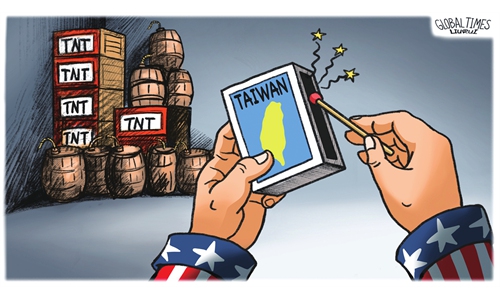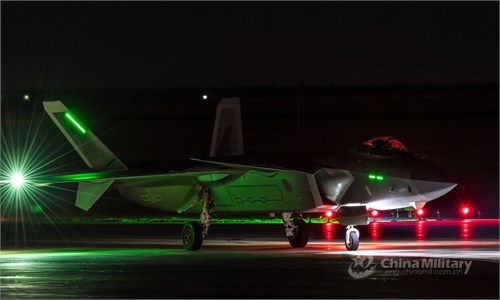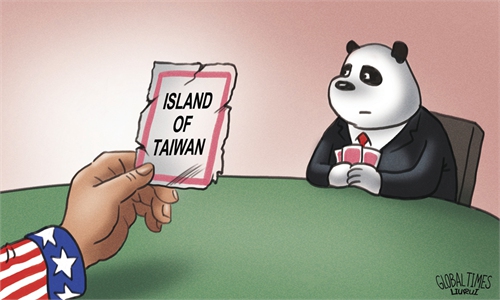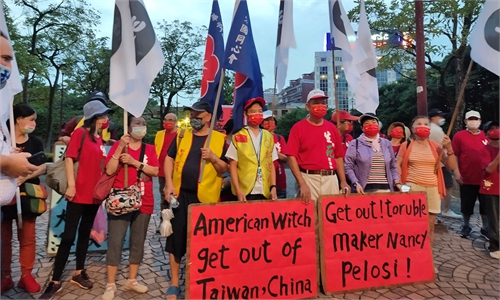Pelosi changes status quo of Taiwan Straits with provocative visit, exposes US long-term miscalculation
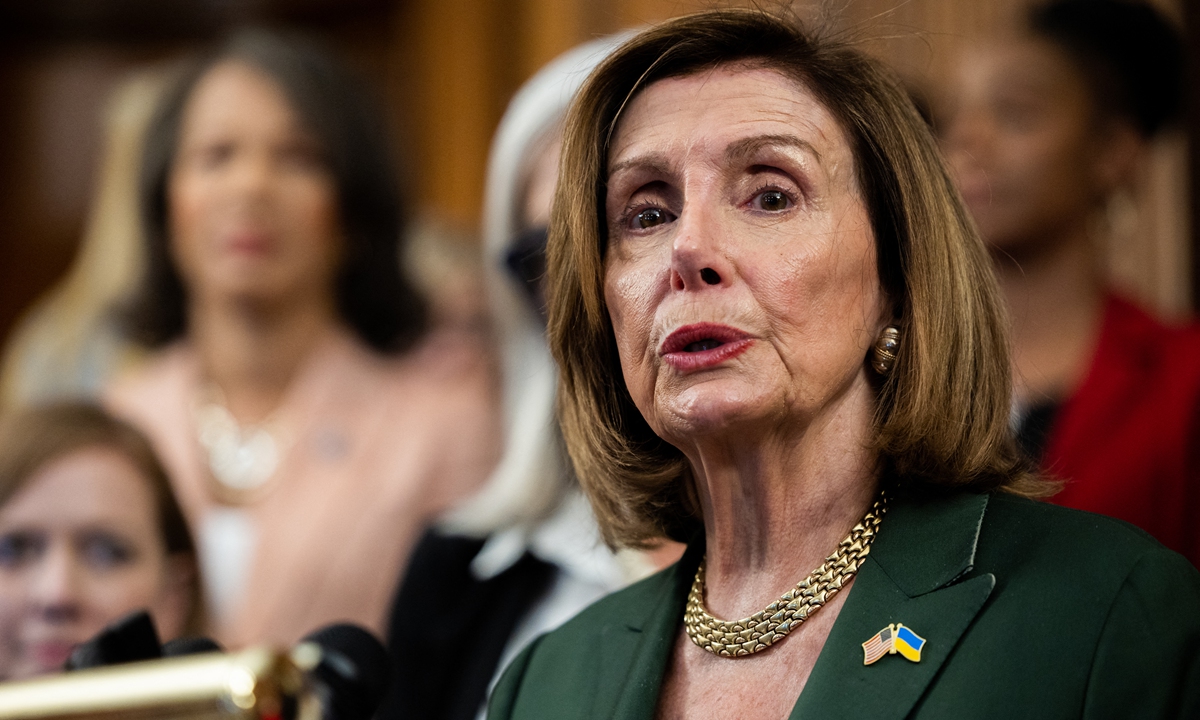
US House Speaker Nancy Pelosi. Photo: AFP
When US House Speaker Nancy Pelosi landed in Taiwan island and touted the US' so-called commitment to the island, her extremely reckless and dangerous move immediately prompted a series of countermeasures from China, ranging from the military to diplomacy to economic sanctions. China's reaction to this serious intrusion on the country's sovereignty is widely considered as rational and reasonable, underscoring its firm strategic determination and sufficient patience to adhere to its own timetable in solving the Taiwan question. And such steady advancement of its own agenda gives Beijing the edge compared with the short-sighted Washington that will lose more points in the long-term geopolitical wrestling match.
Within less than 10 hours after five Chinese authorities including the Chinese Foreign Ministry, Standing Committee of the National People's Congress, Taiwan Affairs Office of the Communist Party of China Central Committee, Foreign Affairs Committee of the Chinese People's Political Consultative Conference National Committee and the Ministry of National Defense, used strong and robust language to condemn Pelosi's visit, the Chinese Foreign Ministry summoned US Ambassador to China Nicholas Burns to protest against Pelosi's visit and Chinese State Councilor and Foreign Minister Wang Yi issued a second strong statement condemning the US' intrusion on China's sovereignty.
Chinese embassies in countries like the UK, Japan and India all released similarly stern messages, and Qin Gang, Chinese envoy to the US, lodged solemn representations and strong protests in the first place with the US White House National Security Council and the Department of State.
Besides unprecedented diplomatic warnings, joint military exercises around the island by the Chinese People's Liberation Army (PLA) continued Wednesday with joint blockades, sea assaults, land attacks and air combat trainings with the participation of advanced weapons including J-20 stealth fighter jets and DF-17 hypersonic missiles after the drills started on Tuesday evening.
The exercises are unprecedented in that conventional missiles are expected to fly over the island of Taiwan for the first time, the PLA forces will enter the sea area within 12 nautical miles to the island, and that the so-called median line will no longer exist, experts said.
In addition, mainland customs announced on Wednesday morning the suspension of imports of citrus fruits and some frozen fish imports from the island. It also suspended exports of natural sand, of which Taiwan reportedly sources over 90 percent from the mainland.
During a press briefing of the Chinese Foreign Ministry on Wednesday, many reporters were concerned with what countermeasures the Chinese government would roll out and whether Beijing will sanction the island or Pelosi, and some followed up with questions such as how China will punish those who offended the country.
"From those questions, I believe that we all consider Pelosi's move as extremely wrong, so it has to be punished," Hua Chunying, spokesperson of the ministry, told the briefing.
"They will reap what they sowed. Relevant countermeasures will be forceful and effective, the US and secessionists in Taiwan will feel the impact," she said.
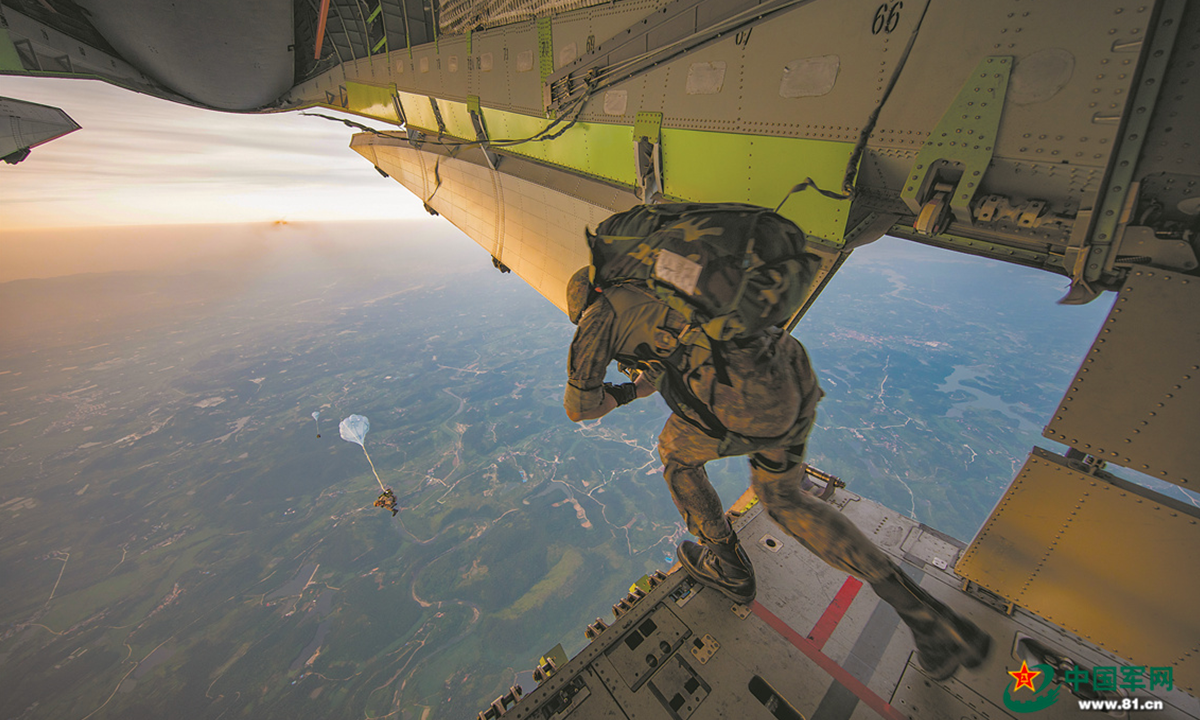
A special operations soldier assigned to the "Thunder" Commando of the PLA Air Force airborne troops jumps out of the aircraft during a parachuting training exercise in mid-summer, 2022. The exercise, lasting for several days, aims to hone the troops' combat capabilities in parachuting, long-range penetration and precision strike operations in the complex environment. (eng.chinamil.com.cn/Photo by Gu Xixi, Xu Jiawang and Guo Shuai)
Rational strategic choiceUntil Pelosi arrived at Taipei's Songshan airport on Tuesday evening, the Chinese side had not adopted one of the possible ways speculated by public opinion in response to the provocation: the PLA could send warplanes and warships to escort her plane. However, some experts said that when it comes to military countermeasures, one factor to be considered is to avoid military conflicts or gunfire in adopting the countermeasure.
When it comes to sending warplanes to intercept Pelosi's plane, such close-range countermeasures can easily lead to a gunfire incident.
"There's no need to launch a war with the US now, as it's not in line with our national strategy," Jin Canrong, associate dean of the School of International Studies at the Renmin University of China, told the Global Times on Wednesday.
Jin believes that in face of Pelosi's visit, Chinese society showed an unprecedented consistent public opinion of "safeguarding the national reunification" and "opposing US provocation," which lays out a strong public opinion foundation for launching the process of reunification, therefore solving the Taiwan question will only be a matter of time in the next few years.
In response to the reported disappointment of the Chinese public for not stopping Pelosi's visit asked by Reuters, Hua from the Chinese Foreign Ministry said it is believed that Chinese people are patriotic in a rational way. "We are in full confidence of firmly safeguarding the country's sovereignty and territorial integrity," she said.
While some foreign observers also questioned whether Pelosi's visit crossed China's red line, Chinese experts affirmed that China's red line is not whether Pelosi visited the island or not but it's the one-China principle.
"Although Pelosi's visit to the island itself is a provocation to the principle, China is now taking subsequent countermeasures to reinforce and defend it in order to make this red line clearer to the US and US politicians. As result, they will bear the serious consequences and others won't dare to challenge it in a similar way," Xin Qiang, deputy director of the Center for American Studies at Fudan University, told the Global Times on Wednesday.
In the eyes of Chinese experts, the visit signals a further decline in the already weak political trust between China and the US, which also changed Washington's so-called status quo over the Taiwan Straits.
"In fact, the cross-Straits situation is entering a new phase now. The US made one extremely dangerous step forward, which means China will take two steps forward," Lü Xiang, a research fellow at the Chinese Academy of Social Sciences, told the Global Times on Wednesday.
The ongoing military drills around the island are a "rehearsal to solve the Taiwan question by force," he said, noting that from now on, the PLA will take tighter control over the airspace and surrounding sea areas of Taiwan to elevate China's security bottom-line, Lü said.
Pelosi's Taiwan visit is opening salvo in a war with China that the US will lose, Franz Gayl, a retired Marine Corps infantry officer and a former Pentagon employee, told the Global Times.
"Do members of the American public understand the horrors their government is about to inflict on their sons and daughters when they are sent off to fight a wholly inappropriate intervention that the US will lose?" Gayl asked.
The status quo has finally changed. Any illusion that the US is or ever was committed to the one-China policy has evaporated, he said.
"The arrival of the Speaker of the House of Representatives and second in line to serve as the Chief Executive in the sitting president's absence has ended decades of reunification efforts. From the perspective of the People's Republic of China, the Three Communiqués which set the conditions for US-PRC diplomatic relations are viewed by the US to be worthless pieces of paper," Galy said.
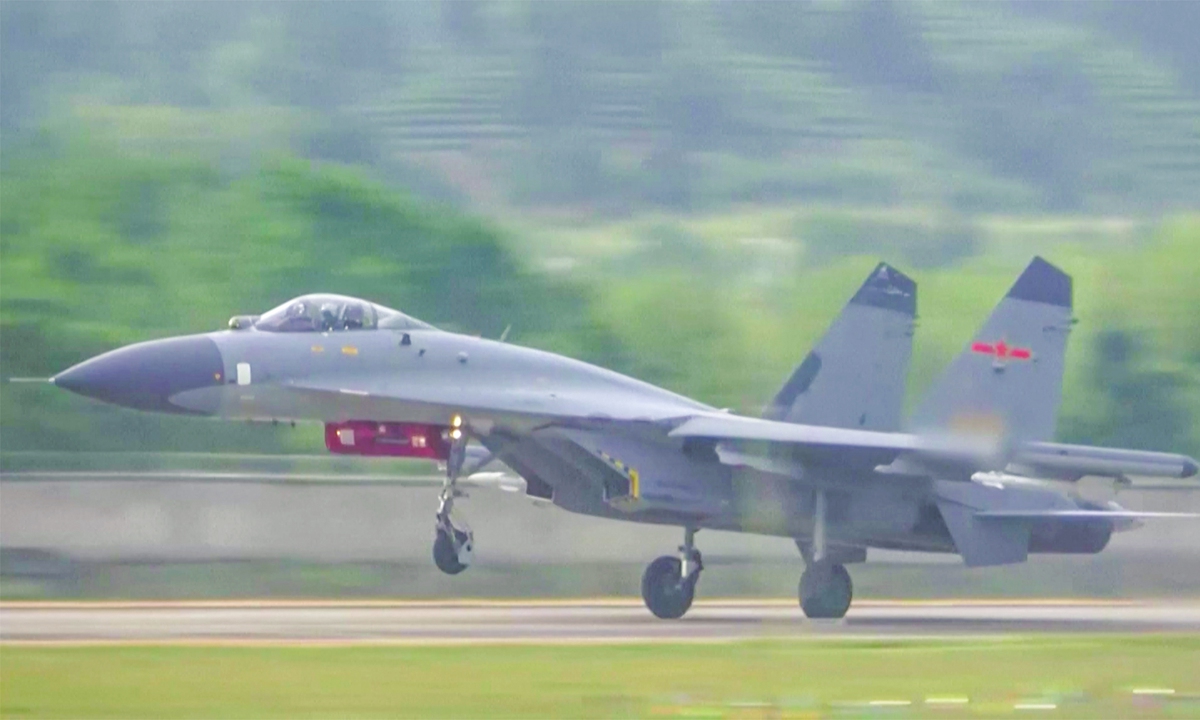
A J-11 fighter jet takes off from an undisclosed airfield on August 3, 2022. The Chinese People's Liberation Army Eastern Theater Command conducted realistic combat-oriented joint exercises in the sea and air space around the island of Taiwan on the day. Photo: VCG
Long-term patience vs. shortsighted interestsUS officials said Biden never told Pelosi not to go, The New York Times reported, but it contradicts the fact that Biden believed US military officials felt it was "not a good idea." When Pelosi arrived in Taiwan, some US-led Western media outlets considered it as a "victory."
However, in contrast to China's long-term strategic determination and patience, the US' biggest miscalculation is to undermine the overall China-US relations for the selfish interests of certain politicians, and when the US is playing the Taiwan card to create crisis scenarios across the Straits, China is steadily turning those scenarios into opportunities to achieve its goal of reunification. Such long-term rational strategic consideration also helped it tackle previous crisis such as the disputes over the Diaoyu Islands, the South China Sea and the riots in Hong Kong in 2019.
"Every time the US provokes China, the result has been shame on themselves," Hua said during the press briefing. The latest example was Pelosi instigating the black-clad riots in Hong Kong and touting the so-called "beautiful sight," which just accelerated the later transition of the city from chaos to stability, she noted.
When the trade war between China and the US started in 2018, many people saw that the US had taken the initiative to attack us and that there was still a gap between China and the US in terms of strength, Xin said, noting that those people thought that China did not have enough countermeasures and therefore "the US was certain to win."
"However, after some time, people realized this was not the case. The US itself has come to the conclusion that more than 90 percent of the cost of the trade war is borne by the American middle-classes," he said.
Pelosi's visit came amid intense global media scrutiny. The 82-year-old is fighting hard to gain more support as the midterm elections loom, and apparently, the US scored the first blow amid the current wrestling match with China by defying Beijing's warning and making her visit happen. However, in a long-term perspective, the US is putting its most important foreign relationship at risk, further weakening its political credibility but accelerating China's reunification, experts said.
"After this visit, China-US relations will surely go backward, and cross-Straits relations will get worse. No matter whether on domestic issues or foreign affairs, the US needs China's help on issues such as climate change, North Korean nuclear issue, the Ukraine crisis and its own inflation, but how much support can the US government gain from China after this?" Xin said.
Reunification is considered as a final step to achieve China's rejuvenation, and the Chinese government has its own pace in solving the Taiwan question, experts said. But Pelosi's reckless move largely helped this process, making the whole world closely observe China's irrefutable sovereignty over Taiwan and how the US constantly lost points in its international morality and image by hurting China-US relations.
It looks like the visit helped the US "score a win," just for now, but in the long run, it will lose more advantages, especially when China completes its rejuvenation, it will be a full-scale wrestling match between China and the US and the latter will see its hegemonic position in the world diminish, experts predicted.

